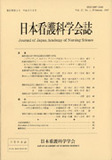Japanese
English
- 販売していません
- Abstract 文献概要
- 参考文献 Reference
- サイト内被引用 Cited by
要旨
本研究の目的は,地域社会で生活するがん体験者にとっての健康の意味とその構造を明らかにすることである.
研究方法にはエスノグラフィの手法を用いた.インタビューと参加観察によって収集したデータを,言語間の関係と差異の体系を発見することにより分析し,地域社会で生活するがん体験者にとっての健康を構成する17領域のカテゴリを導き出した.インタビューは30名のがん体験者に実施した.17領域のカテゴリ内の結局は自分だという思いの種類をテーマをあらわすカテゴリとし,このカテゴリを核に17領域のカテゴリーを統合した.そして『病気体験と普通の生活との関係』と『結局は自分だという自覚構造』の二側面から,がん体験者の健康の構造を示した.
地域で生活するがん体験者にとっての健康は,彼らが結局は自分だという思いをつかみ自分のものにする過程で,がんの体験により特別なこととなってしまった普通の生活が,再び日々の生活の一部となるなかにあらわされていた.本研究結果は,がん体験者が自分自身のなかで健康をつかもうとしていること,そしてそのためには,がんの特徴にも動じない自己および安定した外界を得るための援助が必要であることを示唆していた.
Abstract
The purpose of this study is to examine the meaning and structure of cancer survivors' perception of their health. An ethnographic approach is used in an inductive analysis of survivors' behavior. Thirty cancer survivors were examined through interviews and participant observation (participant observation was conducted in their own homes, offices, outpatient departments, or at the meetings of survivors' self-help groups).
The cancer survivors' perceptions of their health, described in their own words, are categorized in 17 “folk domains of concepts”. Among them, category A, “kekkyoku-wa-jibun-da (After all, there is nobody but me)” was selected as the tentative theme : the remaining domains were reorganized by their relationship with this theme domain.
Through this study, it was found that the theme domain plays an important role when a cancer survivor struggles for survival and arrives at a state in which extraordinary circumstances brought about by cancer do not bother him any longer. This finding indicates that sound recovery from cancer can be achieved through harmony between a cancer survivor's self and his daily life. This also suggests that help should be provided to cancer survivors to contribute to stable surroundings that enable them to establish a sound self concept.
Copyright © 1997, Japan Academy of Nursing Science. All rights reserved.


